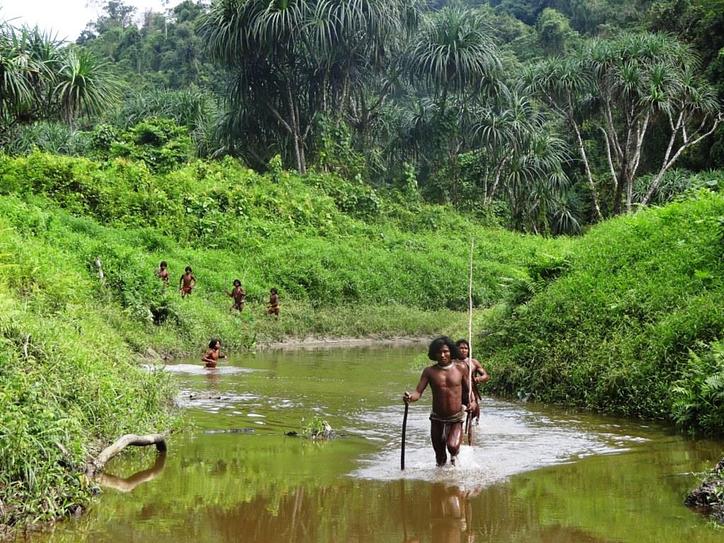Uncontacted people on Indian island face genocide in the name of "mega-development"
The Shompen are one of the most isolated peoples on Earth. They live on Great Nicobar Island in India, and most of them are uncontacted, refusing all interactions with outsiders.
Numbering around 300 people, they are now at risk of being totally wiped out by an Indian government “mega-development” plan to transform their small island home into the “Hong Kong of India.”
If the project goes ahead, huge swathes of their unique rainforest will be destroyed – to be replaced by a mega-port; a new city; an international airport; a power station; a defense base; an industrial park; and up to 650,000 settlers – a population increase of nearly 8,000%.
An island unlike any other
For centuries, most Shompen have refused all contact with outsiders, and this has kept them safe from the terrible effects of contact experienced by most other Indigenous peoples of the Andaman and Nicobar Islands.
Living in the rainforest of Great Nicobar Island in the eastern Indian Ocean, the Shompen have guarded and maintained a unique landscape for thousands of years. The Shompen are nomadic hunter-gatherers, living in small groups, whose territories are identified by the rivers that criss-cross the rainforest. 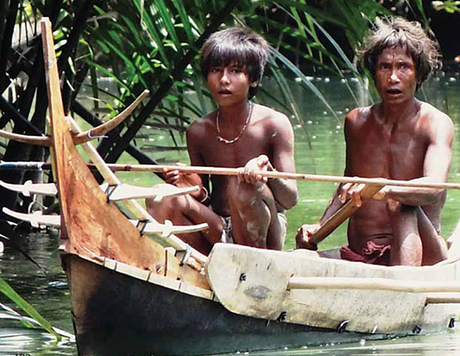 © Anthropological Survey of India
© Anthropological Survey of India
The Shompen collect a wide variety of rainforest plants, but their staple food is the pandanus fruit, which they call larop. Like other hunter-gatherers, the Shompen have an intricate knowledge of their rainforest and they use the flora of the island in a multitude of ways. The White Dhup tree, for example, is used to make incense, mosquito repellent and even a type of chewing gum.
The Shompen hunt throughout the year, and monkeys, pigs, lizards and crocodiles are all important parts of their diet. They also plant small gardens, cultivating lemon, chillies and betel, amongst other plants.
The Shompen worship the moon, known as Houou, as their goddess, whom they believe created the universe. When somebody dies, the moon goddess is believed to come down to Earth to take them to paradise, and the Shompen identify marks on the moon as signs of their earliest ancestors.
Their home, Great Nicobar Island, is small but has extremely high levels of biodiversity. Around 95% of the island is covered in rainforest and it’s home to 11 species of mammals, 32 species of birds, 7 species of reptiles and 4 species of amphibians, all found only here. It’s a place where monitor lizards and crocodiles share the rainforest with macaques and tree shrews, where giant turtles swim among the coral reefs with dugongs and dolphins.
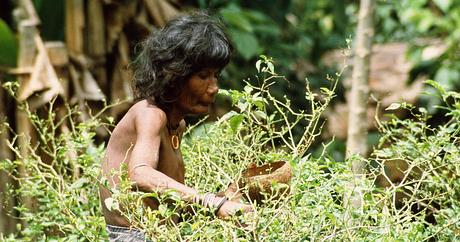 © Survival
© Survival
The right to reject contact
While a few Shompen have contact with their Nicobarese Indigenous neighbors, settlers and government officials, most remain in the rainforest and reject contact with outsiders. We know very little about the Shompen, and their languages have never been fully translated. This does not mean that the Shompen are unaware of the outside world but, for the most part, they choose to be left alone. As with the Sentinelese people in the nearby Andaman Islands, outsiders forcing their way into Shompen territory is illegal and could be deadly for them. That's why in March 2025, American influencer Mykhailo Viktorovych Polyakov was arrested for trying to contact the Sentinelese, and could face jail.
The few Shompen who do leave the rainforest tend to do so to collect and exchange things with outsiders before returning to the island’s interior and sharing them among other Shompen families. Like other uncontacted peoples around the world, the Shompen are incredibly vulnerable to diseases to which they have no immunity. In the 1980s, up to 100 Shompen reportedly died during an epidemic following the effects of contact with outsiders. As such, Shompen who return to the rainforest have been known to quarantine in special houses outside their communities. A government report stated:
The report then acknowledged then that these uncontacted Shompen were certainly “healthier than those who have contacts with others”. Most contact for the Shompen at the moment occurs as it should for all Indigenous communities - on their own terms.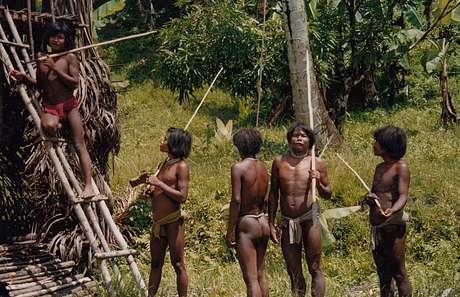
Mega development = mega disaster
But the Indian government is now planning to transform the Shompen’s small island into the ‘Hong Kong of India', which will totally change their lives forever. The ‘Great Nicobar project’ will have a devastating impact on the lives of the Shompen and the neighbouring Nicobarese. As neither peoples have given their consent to the scheme, it violates both Indian and international law.
The authorities plan to create a mega-port; a city; an international airport; a power station; a defence base; an industrial park; and tourism zones, spread over more than 244 square km of land, including 130 square km of rainforest. The government claims that it will ‘offset’ the loss of rainforest through planting new trees in the scrublands of North India. Such offsetting projects are false solutions and Survival is actively campaigning against the growing threat they pose to Indigenous peoples around the world.
To the Shompen, every tree, plant, leaf and flower is sacred and has a spirit of their own. It’s hard to imagine what cutting down millions of trees will mean to a people who do not even allow the cutting of leaves on their territory.
Read Survival's new report here
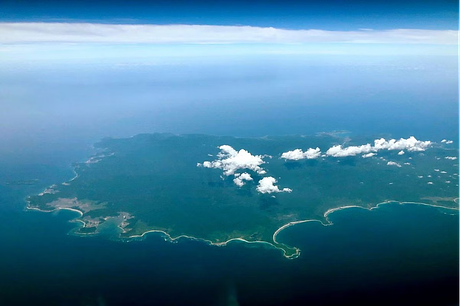 © TwitterAround 95% of Great Nicobar Island is covered in rainforest
© TwitterAround 95% of Great Nicobar Island is covered in rainforest
 © Twitter
© TwitterThe mega-project will take up around a third of the island – half of it within the official Tribal Reserve. Equally disastrous is the massive population explosion planned for Great Nicobar. The total population of the island is currently around 8,000, but the government plans to settle up to 650,000 people there under the scheme, a population the size of Las Vegas. Finally, the Indian government wants to encourage around a million tourists and other visitors to the island every year, which is likely lead to “human safaris” taking place among the Shompen as has happened for years to the Ang (formerly known as Jarawa) people of the neighbouring Andaman Islands.
Shompen communities, along with their hunting and foraging grounds, will be devastated by the project. Their sacred river system will also be ruined. This will in turn destroy their pandanus trees, one of their most important sources of food. With their rivers devastated, the Shompen’s ability to survive and entire way of life will face collapse.
As well as causing unprecedented social and environmental devastation for the Shompen, these plans also drastically increase their exposure to outside diseases to which could wipe them out.
The Indian government is well aware of such risks and their official Impact Assessment for the project states: “Any disturbance or alteration in the natural environmental setup where they live, may cause serious threat to their existence” and “once infections spread among the tribal [Shompen]...the whole community may face extinction.” However, in an attempt to mitigate the risks, the government is proposing sinister sounding “geo-fencing cum surveillance towers” to monitor the Shompen.
In February 2024, 39 international genocide experts wrote to the Indian President, describing the mega-project as a "death sentence for the Shompen, tantamount to the international crime of genocide". They called for the scheme to be immediately abandoned.
It’s impossible to imagine that the Shompen will be able to survive this overwhelming and catastrophic transformation of their island. © Ministry of Ports, Shipping and Waterways
© Ministry of Ports, Shipping and Waterways
Take Urgent Action for the Shompen
Despite countless individuals and organizations in India calling for the project to be scrapped, the Indian government seems determined to go ahead and has bulldozed through the official clearance processes, all without the consent of the Shompen and Nicobarese.
Survival is calling on people around the world to ensure that this highly destructive project is stopped.
The Shompen are estimated to have lived on Great Nicobar for up to 10,000 years, and have every right to continue doing so, but their very survival is now at stake. They urgently need as many people as possible around the world to stand in solidarity with them, if they’re to survive this terrible threat to their existence.
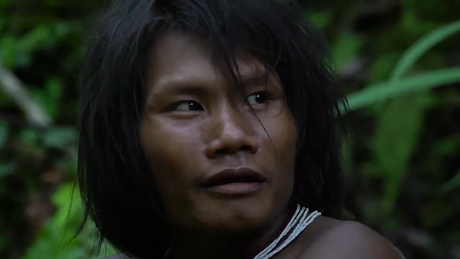 © Andaman Nicobar Collective
© Andaman Nicobar Collective
Join the mailing list
There are more than 476 million Indigenous people living in more than 90 countries around the world. To Indigenous peoples, land is life. Find out more about them and the struggles they’re facing: sign up to our mailing list for occasional updates.
News from The Shompen
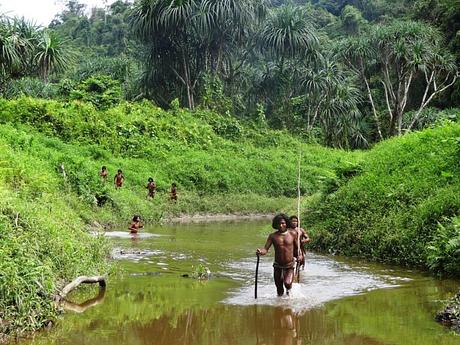
Pressure mounts on Indian government over “genocidal” Great Nicobar mega-project
Calls are growing for the Indian government to scrap its controversial Great Nicobar project
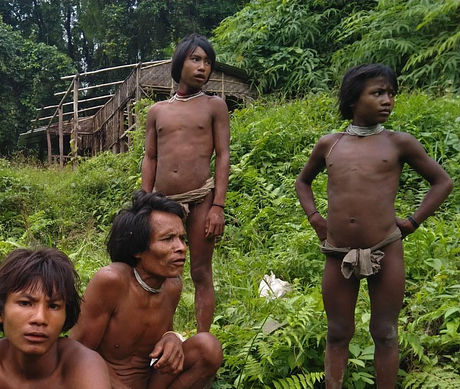
New report: Indian government plans spell disaster for uncontacted island tribe
Shompen people will not survive if the Great Nicobar project goes ahead

Indian experts say mega-project will lead to uncontacted island tribe's "extinction"
Renowned Indian experts on the Indigenous peoples in the region are demanding that the Great Nicobar Development Project be scrapped.

Experts say India risks genocide of uncontacted island tribe with mega-port plan
Genocide scholars have warned that India's plans to turn an uncontacted tribe’s island into a mega-port will wipe them out.

Indian ministries set to approve mega-project that will destroy uncontacted island people
Unique uncontacted tribe at risk of being destroyed by mega-development, with which authorities in India have vowed to go ahead.
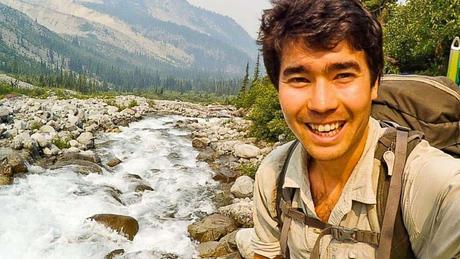
India: As new film is released on the Sentinelese, their uncontacted neighbors face destruction
Campaigners have warned that the imminent destruction of the Sentinelese's little-known neighbors, the Shompen, is going unnoticed.

